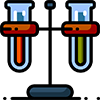Science: Course Catalog - High School
Science - Natural Science
 Three credits required.
Three credits required.
Two must have a lab component.
Biology or its equivalent is a required course.
2000310 BIOLOGY 1
Biology is intended to expose students to the designs and patterns of living organisms that have been created by God. In preceding years, students should have developed a foundational understanding of life sciences. This biology course will expand upon that knowledge and incorporate more abstract knowledge. The student's understanding should encompass both the micro and macro aspects of life and this biology course includes both. The major concepts covered are taxonomy, the chemical basis of life, cellular structure and function, genetics, microbiology, botany, human anatomy and physiology, and ecological principles.
Students at this level should show development in their ability and understanding of scientific inquiry. The units contain experiments and projects that seek to develop a deeper conceptual meaning for the student and actively engage the student. The continued exposure of science concepts and scientific inquiry will serve to improve the student's skill and understanding.
Biology should be preceded or accompanied by an Algebra I course.
Upon completion of the course, students should be able to do the following:
Classify different animals using taxonomy.
Demonstrate a knowledge of molecular structure as it relates to organic compounds.
Use a microscope to study microscopic organisms.
Describe cells, they're different parts, and the function of a cell.
Discuss the different parts of a plant.
Describe and explain the function of each system in the human body.
Perform Punnett square functions to determine probability of inheritance.
Differentiate between mitosis and meiosis and between asexual and sexual reproduction.
Understand the impact man has on the environment.
2000320 BIOLOGY 1 HONORS
This course provides exploratory experiences and laboratory and real-life applications in the biological sciences. Laboratory investigations, which include the use of scientific research, measurement, laboratory technologies, and safety procedures, are an integral part of this course.
This course will include additional requirements to provide for a more in-depth or enriched study of the course requirements than Biology 1. The content includes, but is not be limited to, the following:
The nature of science, matter, energy, and chemical processes of life,
cells:
biology, reproduction, and communication, genetics:
principles, molecular basis, diversity, and biotechnologies:
levels of organization, classification, and taxonomy,
structure, function, and reproduction of plants, animals, and microorganisms,
behavior of organisms, interdependence of organisms, humans, and the environment,
biological selection, adaptations, and changes through time,
agricultural, food, and medical technologies and careers.
2000350 ANATOMY AND PHYSIOLOGY
Explore the organization of the human body and how it works. Acquire knowledge necessary to understand what the body is doing and how you can help the body cope with many different situations. Body systems will be studied in order to understand how their structure, location, and function allow for interaction with other parts of the body.
The content includes, but is not be limited to, the following catagories:
Implementation of scientific habits of mind,
application of scientific knowledge, methodology, and historical context to solve problems,
use of laboratory technologies.
Topics to include:
Introduction to Anatomy and Physiology,
Tissues,
Skin-The Largest Organ,
Human Skeleton,
Bone Tissue and Markings,
Axial and Appendicular Muscles,
Skeletal Muscle, Muscle Contraction, Physiology of Muscle,
Nervous System, The Spinal Cord, The Brain, Sympathetic and Parasympathetic,
Nerve Conduction,
Senses,
Endocrine System,
Hormones,
Cardiovascular System,
Blood Vessels and Electrocardiogram,
Components of Blood, Homeostasis, Typing, and Transfusion,
Respiratory System,
Digestive System,
Molecules of Life,
Macromolecule Reactions,
Enzymes,
Excretory System,
Excretory Structures,
Immune System,
Lymph System,
Reproductive System,
Fertilization to Birth and Fetal Circulation
2000360 ANATOMY AND PHYSIOLOGY HONORS
This course enables students to develop understanding of the relationships between the structures and functions of the human body. Laboratory investigations of selected topics in the content, which also include use of the scientific method, measurement, laboratory apparatus, and safety procedures, are an integral part of this course. Inquiry into current technology and applications of anatomical and physiological principles and their relationship to the environment is encouraged.
This course will include additional requirements to provide for a more in-depth or enriched study of the course requirements than Anatomy and Physiology. The content includes, but is not be limited to, the following:
Implementation of scientific habits of mind,
application of scientific knowledge, methodology, and historical context to solve problems,
use of laboratory technologies.
Topics to include:
Introduction to Anatomy and Physiology,
Tissues,
Skin-The Largest Organ,
Human Skeleton,
Bone Tissue and Markings,
Axial and Appendicular Muscles,
Skeletal Muscle, Muscle Contraction, Physiology of Muscle,
Nervous System, The Spinal Cord, The Brain, Sympathetic and Parasympathetic,
Nerve Conduction,
Senses,
Endocrine System,
Hormones,
Cardiovascular System,
Blood Vessels and Electrocardiogram,
Components of Blood, Homeostasis, Typing, and Transfusion,
Respiratory System,
Digestive System,
Molecules of Life,
Macromolecule Reactions,
Enzymes,
Excretory System,
Excretory Structures,
Immune System,
Lymph System,
Reproductive System,
Fertilization to Birth and Fetal Circulation
2001310 EARTH SPACE SCIENCE
Note: Students who are on the college prep track, or who plan to take Chemistry, should take Physical Science instead of Earth Space Science as it provides a better foundation for that future course.
A course that explores Earth’s structure, interacting systems, and place in the universe. The course uncovers concepts and processes found in:
Astronomy – Earth’s place in and interaction with space,
Geology – physical structure and dynamic processes,
Meteorology – atmosphere, weather and climate, and
Oceanography – oceans and marine life.
Students will have the opportunity to evaluate and explore many scientific concepts by participating in interactive lab sessions, conducting hands-on activities, and completing projects designed to improve the understanding of Earth and its dynamic functions. Upon completion of the course, students should be able to do the following:
Gain increased awareness about where Earth came from, how Earth functions and sustains life, and how the many systems and processes of Earth rely on and balance one another.
Improve scientific evaluation skills and apply them to the study of Earth’s physical geography and dynamic processes.
Discover tools that allow for the study of Earth and its further exploration.
The content includes, but not be limited to, the following:
the nature of science,
the universe and the solar system,
the developmental cycle of stars,
the earth-moon system,
space exploration,
formation of igneous, sedimentary, and metamorphic rocks
identification and, classification of rocks and minerals,
geological divisions of the earth,
formation of land forms and basic mountain types,
fundamentals of plate tectonics,
formation of rivers and water systems, glaciers,
hydrologic cycle,
physical oceanography,
meteorology, including development of hazardous weather, weather mapping, weather systems, frontal, development, and satellite imagery,
types of soils and erosion
renewable and nonrenewable energy resources
2001320 EARTH SPACE SCIENCE HONORS
Note: Students who are on the college prep track, or who plan to take Chemistry, should take Physical Science instead of Earth Space Science as it provides a better foundation for that future course.
This course develops and applies concepts basic to the Earth, its materials, processes, history, and environment in space.
The content includes, but is not be limited to, the following:
The nature of science, the universe and the solar system, the developmental cycle of stars, the earth-moon system, space exploration, formation of igneous, sedimentary, and metamorphic rocks and identification and classification of rocks and
minerals, geological divisions of the earth, formation of land forms and basic mountain types, fundamentals of plate tectonics, formation of rivers and water systems, glaciers, hydrologic cycle, physical oceanography, meteorology, including development of hazardous weather, weather mapping, weather systems, frontal development, and satellite imagery, types of soils and erosion, renewable and nonrenewable energy resources.
This course will include additional requirements to provide for a more in-depth or enriched study of the course requirements than Earth/Space Science.
2001350 ASTRONOMY
This course enables students to develop and apply knowledge of the universe and compare the conditions, properties, and motions of bodies in space. Emphasis shall be placed on concepts basic to Earth, including materials, processes, history, and the environment. Laboratory investigations of selected topics in the content to foster inquiry should include use of the scientific method, measurement, laboratory apparatus, and safety procedures as an integral part of this course. Use of satellite imagery, image-processing techniques, model development with behavior-over-time graphs, and night telescopic observations are encouraged.
The content includes, but is not be limited to, the following:
Implementation of scientific habits of mind -application of scientific knowledge, methodology, and historical context to solve problems, use of laboratory technologies, terminology, historical developments from ancient cultures to the present, instruments for collection of astronomical data, celestial sphere, ascension and declination, planets, asteroids, and comets, effects of the motions of the Earth, effects of the Earth-Moon system, the sun, astronomical measurements, stars, cosmology, connections between astronomy, technology, and society. space flight and exobiology.
2002500 MARINE SCIENCE 1
This course provides an overview of the marine environment. Laboratory investigations of selected topics in the content, which also include the use of scientific method, measurement, laboratory apparatus, and safety procedures, are an integral part of this course.
The content includes, but is not be limited to, the following:
The nature of science, the origins of the oceans, the chemical, physical, and geological aspects of the marine environment, ecology of various sea zones, marine communities, the diversity of marine organisms, characteristics of major marine ecosystems, characteristics of major marine phyla/divisions, the interrelationship between man and the ocean.
2003310 PHYSICAL SCIENCE
Note: Students who are on the college prep track, or who plan to take Chemistry, should take Physical Science instead of Earth Space Science as it provides a better foundation for that future course.
An entry-level science course covering basic concepts found in chemistry and physics. An experimental-investigative course dealing with matter, energy, motion and force, including the study of mechanics, heat, sound, light, electricity, magnetism and atomic structure. The experiments and investigative activity are designed to induce and stimulate participation and involvement and teach laboratory techniques. Throughout the course, students will have opportunities to observe simulations, investigate ideas, and solve problems.
The content includes, but is not be limited to, the following:
Segment 1
Speed, Velocity and Acceleration, The Laws of Motion, Forces in Action, Energy, Work and Power, Energy Transfer, Introduction to waves, Mechanical waves, Electromagnetic waves, Reflection and Refraction, Electrical Charges, Electrical Current, Electrical Circuits, Magnetism, Relationship between Electricity and magnetism, Renewable and Non-Renewable Resources.
Segment 2
Classifying Matter, States of Matter, Properties of Matter, Atomic Theory, Atomic Mass, Periodic Table of Elements, Chemical Bonding, Chemical Formulas, Hydrogen hydroxide, Solubility and Concentration, Acids and Bases, Chemical reactions, Classifying Chemical Reactions, Reaction Rates and Energy, Radioactivity, Nuclear Reactions, Better Living through Chemistry.
2003320 PHYSICAL SCIENCE HONORS
Note: Students who are on the college prep track, or who plan to take Chemistry, should take Physical Science instead of Earth Space Science as it provides a better foundation for that future course.
An entry-level science course covering basic concepts found in chemistry and physics. An experimental-investigative course dealing with matter, energy, motion and force, including the study of mechanics, heat, sound, light, electricity, magnetism and atomic structure. The experiments and investigative activity are designed to induce and stimulate participation and involvement and teach laboratory techniques. Throughout the course, students will have opportunities to observe simulations, investigate ideas, and solve problems.
The content includes, but is not be limited to, the following:
Segment 1
Speed, Velocity and Acceleration, The Laws of Motion, Forces in Action, Energy, Work and Power, Energy Transfer, Introduction to waves, Mechanical waves, Electromagnetic waves, Reflection and Refraction, Electrical Charges, Electrical Current, Electrical Circuits, Magnetism, Relationship between Electricity and magnetism, Renewable and Non-Renewable Resources.
Segment 2
Classifying Matter, States of Matter, Properties of Matter, Atomic Theory, Atomic Mass, Periodic Table of Elements, Chemical Bonding, Chemical Formulas, Hydrogen hydroxide, Solubility and Concentration, Acids and Bases, Chemical reactions, Classifying Chemical Reactions, Reaction Rates and Energy, Radioactivity, Nuclear Reactions, Better Living through Chemistry.
This course will include additional requirements to provide for a more in-depth or enriched study of the course requirements than Physical Science.
2003340 CHEMISTRY 1
Chemistry is intended to expose students to the designs and patterns in the world that God has created. In preceding years, students should have developed an understanding for the macroscopic properties of substances and been introduced to the microstructure of substances. This chemistry course will expand upon that knowledge, further develop the microstructure of substances, and teach the symbolic and mathematical world of formulas, equations, and symbols. The major concepts covered are measurement, atomic structure, chemical formulas and bonding, chemical reactions, stoichiometry, gases, chemical equilibrium, and organic chemistry.
Students at this level should show development in their ability and understanding of scientific inquiry. The units contain experiments and projects that seek to develop a deeper conceptual meaning for the student and actively engage the student. The continued exposure of science concepts and scientific inquiry will serve to improve the student’s skill and understanding.
Chemistry should be preceded by an Algebra I course and preceded or accompanied by an Algebra II course
Upon completion of the course, students should be able to do the following:
Calculate and convert units using scientific notation and significant figures.
Explain the differences between elements, compounds, and mixtures.
Use Avogadro’s number and the gas laws to calculate different variables in chemistry.
Explain and use the periodic table.
Recognize symbols for common elements.
Differentiate between the different types of bonds.
Predict how different elements will reacts.
Describe acid-base reactions and redox reactions.
Demonstrate an understanding of organic chemistry and carbon compounds.
2003350 CHEMISTRY 1 HONORS
Chemistry is intended to expose students to the designs and patterns in the world that God has created. In preceding years, students should have developed an understanding for the macroscopic properties of substances and been introduced to the microstructure of substances. This chemistry course will expand upon that knowledge, further develop the microstructure of substances, and teach the symbolic and mathematical world of formulas, equations, and symbols. The major concepts covered are measurement, atomic structure, chemical formulas and bonding, chemical reactions, stoichiometry, gases, chemical equilibrium, and organic chemistry.
Students at this level should show development in their ability and understanding of scientific inquiry. The units contain experiments and projects that seek to develop a deeper conceptual meaning for the student and actively engage the student. The continued exposure of science concepts and scientific inquiry will serve to improve the student’s skill and understanding.
Chemistry should be preceded by an Algebra I course and preceded or accompanied by an Algebra II course
Upon completion of the course, students should be able to do the following:
• Calculate and convert units using scientific notation and significant figures.
• Explain the differences between elements, compounds, and mixtures.
• Use Avogadro’s number and the gas laws to calculate different variables in chemistry examples.
• Explain and use the periodic table.
• Recognize symbols for common elements.
• Differentiate between the different types of bonds.
• Predict how different elements will reacts.
• Describe acid-base reactions and redox reactions.
• Demonstrate an understanding of organic chemistry and carbon compounds.
This course will include additional requirements to provide for a more in-depth or enriched study of the course requirements than Chemistry 1.
2003380 PHYSICS 1
Physics is intended to expose students to the design and order in the world. In preceding years, students should have developed a basic understanding of the macroscopic and microscopic world of forces, motion, waves, light, and electricity. The physics course will expand upon that prior knowledge and further develop both. The curriculum will also seek to teach the symbolic and mathematical world of formulas and symbols used in physics. The major concepts covered are kinematics, forces and motion, work and energy, sound and light waves, electricity and magnetism, and nuclear physics.
Students at this level should show development in their ability and understanding of scientific inquiry. The units contain experiments and projects that seek to develop a deeper conceptual meaning for the student and actively engage the student. The continued exposure of science concepts and scientific inquiry will serve to improve the student’s skill and understanding. Physics should be preceded by Algebra I and II courses and geometry.
Upon completion of the course, students should be able to do the following:
Use scalars and vectors to visualize and calculate concepts of motion.
Articulate Newton’s and Kepler’s laws of motion.
Demonstrate an understanding of how energy is transferred and changed from one form to another.
Describe how sound and light waves act and react.
Differentiate between static and current electricity and describe each one.
Know the relationship between magnetism and electricity.
Have a general understanding of atomic theory, including fusion and fission.
The following is a listing of Common Dual Enrollment Courses
BSC 1005 SURVEY OF BIOLOGICAL SCIENCE
A college Dual Enrollment Course, that is counted as two one half credit grades equaling one credit, per Florida Department of Education guidelines.
This course is a one semester general overview of the unifying principles governing life and is intended for students who are non-science majors. (Students majoring in science should take Principles of Biology I (BSC 1010C) instead of this course.) Course topics include cell structure and function, energy and its transformations, cell division processes, genetics, evolution, and ecology. Basic biological concepts and their applications for living according to the laws of nature are emphasized. This course fulfills the laboratory component of the Natural Science General Education requirement.
BSC 2085 HUMAN ANATOMY AND PHYSIOLOGY I
A college Dual Enrollment Course, that is counted as two one half credit grades equaling one credit, per Florida Department of Education guidelines.
This is a fast-paced course that involves an in-depth exploration of chemistry, cell biology, and histology, as well as the integumentary system, skeletal system, joints, muscular system, nervous system, and the special senses of the human body. Laboratory exercises reinforce lecture material through the use of scientific method and measurement, models, microscopes, and dissections. Students should have a basic understanding of chemistry and cell biology before entering this course.
BSC 2086 HUMAN ANATOMY AND PHYSIOLOGY II
A college Dual Enrollment Course, that is counted as two one half credit grades equaling one credit, per Florida Department of Education guidelines.
This course is a continuation of Anatomy and Physiology I (BSC 2085C). This course provides a study of the following topics:the circulatory system (with special emphasis on the heart), the lymphatic system, the immune system, the respiratory system, the digestive system, cellular metabolism, the urinary system, fluid-electrolyte balance, the endocrine system, reproduction, development, and a brief survey of genetics. Laboratory exercises reinforce the lecture topics through experimentation, microscopic work, and dissection (where applicable).
CHM 1025 INTRODUCTION TO CHEMISTRY
A college Dual Enrollment Course, that is counted as two one half credit grades equaling one credit, per Florida Department of Education guidelines.
This is an introductory course in the basic concepts of chemistry. It is designed for students who have had little, if any, instruction in chemistry. Topics covered include: the structure of the atom, the structure of compounds, the periodic table, and basic stoichiometry of equations, as well as measurements, chemical equations, states of matter, solutions, and acids and bases. Some basic organic chemistry may also be covered. Computations employ the most basic algebra with an emphasis on the factor label method of problem solving. Laboratory experience supports and applies the principles of chemistry developed in the lecture portion of the course.
CHM 1045 GENERAL CHEMISTRY I
A college Dual Enrollment Course, that is counted as two one half credit grades equaling one credit, per Florida Department of Education guidelines.
This provides a study of chemistry covering the following topics: mathematics and measurement in chemistry, the periodic table, stoichiometry of chemical equations and reactions in solution, oxidation-reduction reactions, thermo chemistry, atomic and molecular structure, chemical bonding, gases, and intermolecular forces of attraction. Selected experiments reinforce and apply lecture material, with the use of computers in the laboratory as an option.
ESC 1000 SURVEY OF EARTH SCIENCE
A college Dual Enrollment Course, that is counted as two one half credit grades equaling one credit, per Florida Department of Education guidelines.
This course examines the Earth through the study of concepts and principles related to geology, geophysics, oceanography, meteorology, and astronomy. The application of these principles to environmental problems, and other specific problems of current interest, are explored. Demonstrations and multimedia presentations enhance the presentation of the course material.











